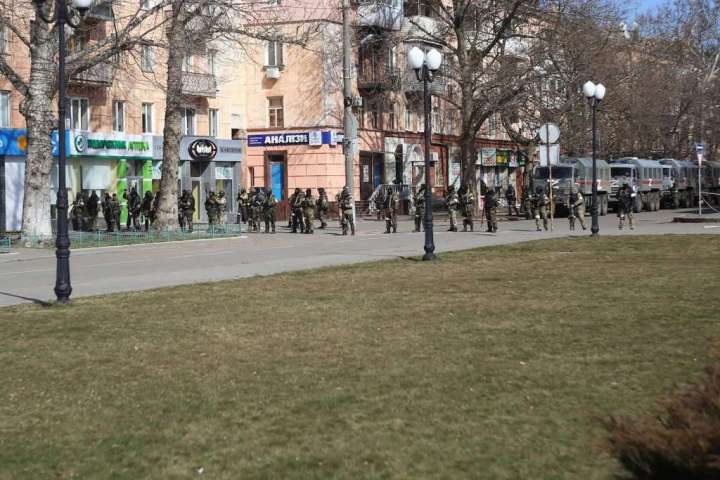Iuliia Mendel is a journalist and former press secretary for Ukrainian President Volodymyr Zelensky.
In occupied Kherson, Russia is imposing a grim, hopeless reality

The occupation has lasted in the city of Kherson, the only provincial capital that has fallen to Russians, since the beginning of March. Moscow has forcefully installed an occupation government there, which recently appealed to Russian President Vladimir Putin to join Russia. Many fear Russia intends to hold a rigged referendum to annex the region or create a people’s republic. On May 25, the Russian leader signed a decree offering fast-track Russian citizenship to residents of Kherson and Zaporizhzhia, a worrying sign of what is to come.
It is hard to understand from afar what life is like for locals in Kherson — but whatever I hear is alarming. While many citizens have left, some remain. A survey from April found that 39 percent of Ukrainians believed leaving their home during wartime was wrong and unacceptable. An additional 35 percent did not want to leave their loved ones. Among them are almost all my relatives.
“We live in a different reality,” a relative told me when I finally managed to get through in late April. She sends me pictures of bullet holes in her house and gate. She has been told Russians can listen to conversations on the phone.
Though Kherson did not suffer as much shelling or bombing as some other regions, Russians still proved they did not care about civilian infrastructure, destroying a school and the biggest mall and shelling some residential areas. They brutally killed Ukrainians fighting as part of territorial defense units. Then they systematically intimidated locals by detaining the most active residents, robbing the homes of local activists, and kidnapping local politicians and journalists.
“Kherson has said its word,” says my relative, obliquely referring to the protests that citizens organized against Russian soldiers and tanks at the beginning of occupation. Initially, Russian troops turned away; then they used stun grenades and bullets against the crowd.
If the city survived, albeit deserted, some villages in the region were simply wiped out. This includes both my grandmothers’ houses in the village where I took my first steps, ate cherries in the summer and read all the books from the local village library. Another relative hid with some locals in the basement of the kindergarten. After a direct hit by a shell on the building, he finally left the village at the end of April.
I worry for the safety of my loved ones constantly — and this is not just about fighting and shelling. Because they are the occupying power, Russian soldiers would not face accountability for sexual violence, even though there have been many reports of rape in the region. Since the first days of the occupation, women and girls have shared news about such cases on their social networks. It is impossible to verify the reports, but many women are terrified.
And even that form of information-sharing could be blocked. The occupation government has announced that social media platforms might be shut down — as has been done in Russia — to restrict information not controlled by the Kremlin. Russian propaganda is already pouring out of television in the Kherson region, and Russians are trying to introduce the ruble in some towns.
The occupation government installed by Russia is full of disreputable figures who do not represent the views of most Ukrainians. Blogger Kirill Stremousov, who was active in anti-vaccination protests, is now deputy head of the Kherson civil-military administration. The newly appointed head of the Kherson administration, Vladimir Saldo, has been investigated by Ukraine’s Security Service for allegedly cooperating with the KGB successor FSB (though he was not charged) and was supportive of pro-Russian President Viktor Yanukovych. Not all of the collaborators are outsiders: In April, President Volodymyr Zelensky stripped the former head of the Kherson security service of his general rank, calling him a traitor. Indeed, a sense of betrayal has haunted Kherson residents since the first days of Russia’s war against Ukraine.
In Russia and in the occupied territories of Ukraine, people are living in a state-imposed reality that is becoming even more surreal than that of Soviet-era communism. New generations are growing up educated in increasingly rigid narratives of obedience and hopelessness. I never imagined I would have to worry about this happening in my hometown.
Now, as I wait every day for information from my relatives, I implore the world: Do not believe Moscow’s lies about occupied towns and regions such as Kherson. Do not forget those living under occupation, waiting for freedom under silence, secrecy and fear.






